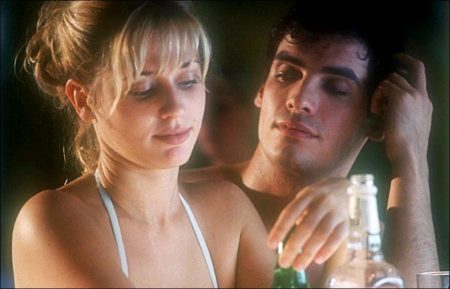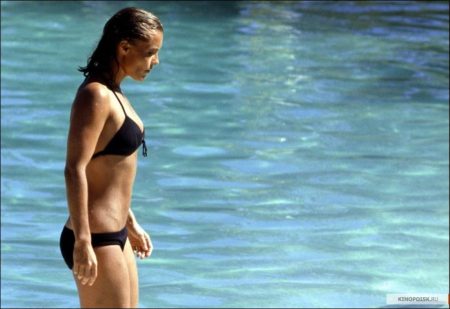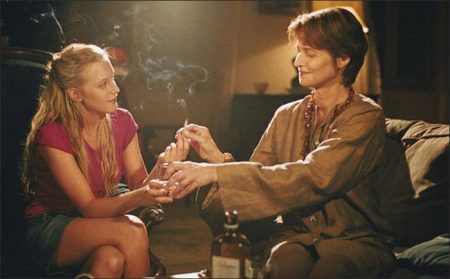In Swimming Pool Charlotte Rampling first appears in a belted tan raincoat, her hair cut short and her features a mask of no-nonsense Britishness. Her character, Sarah Morton, is a mystery novelist, whose Inspector Durwell books have a loyal, though aging readership.
When Sarah encounters a young hotshot writer at her publisher’s offices, he is sure to tell her how much his mother loves Inspector Durwell. This is meant as a compliment, but it only piques Sarah’s frustration. To help her out of her midlife, midcareer rut, her oleaginous editor (Charles Dance) lends her his house in the Luberon region of southern France, a place swathed in greenery and bathed in soft sunshine.
The contrast with London could not be more obvious, and it is one of several that François Ozon, who wrote (with Emanuèle Bernheim) and directed this clever, teasing entertainment, lays out with devious nonchalance. Shortly after her arrival at the house, Sarah is joined by the editor’s daughter, Julie, whom she believes to be the issue of an unhappy dalliance he had with a local woman many years before.
By parentage Julie may be half English (and Ludivine Sagnier speaks the language well enough), but at least at first she is pointedly Sarah’s opposite and perhaps the embodiment of certain English prejudices about the rude, undisciplined French — just as Sarah herself may personify certain clichés about the English. While the older woman values peace and privacy, Julie is loud and wanton. She plays music late into the night, walks around with nothing on and brings home a succession of men for noisy, drunken sex.
The disparity may seem a little overdrawn — (”Murder She Wrote” meets ”Girls Gone Wild”) — but as the story takes shape, Mr. Ozon, Ms. Rampling and Ms. Sagnier complicate it in subtle and fascinating ways. Sarah’s veneer of repression and prim disapproval softens in the Mediterranean light, and you begin to suspect that what had seemed like reserve was really an especially refined and graceful expression of sensuality. You can see this in the way Ms. Rampling smokes a cigarette, attacks a profiterole in a quiet outdoor cafe, or eyes the waiter, a rustic hunk named Franck (Jean-Marie Lamour), who seems destined to become one of Julie’s easy conquests.
The relationship between the women thaws, as Sarah discovers the hurt, abandoned child underneath the late-adolescent bravado. Whereas Ms. Rampling is an actress of infinite nuance — as shown in her wrenching, ravishing performance in Mr. Ozon’s ”Under the Sand” two years ago — Ms. Sagnier’s appeal lies in her directness. She wields her sexual magnetism casually and with the merest dash of self-conscious cruelty.
The two women, the handsome waiter, the hours of idleness, the swimming pool: it sounds like, and on one level is, a scenario worthy of Eric Rohmer. But Mr. Ozon is as perverse as he is resourceful, so he slyly turns his delicate study in generational and cross-cultural sexual rivalry into a suspense thriller. There is a mystery lurking in Julie’s past, a dead body in the pool house, a wizened dwarf all dressed in black: omens, premonitions, suspicions that things are not what they seem.
And they aren’t, which is as much as I’m inclined to say. Mr. Ozon’s gift, extended in different directions from movie to movie, is to combine low-key observational intelligence with high literary cunning. In movies like ”Water Drops on Burning Rocks” and ”8 Women” (both of which featured Ms. Sagnier) he likes to wander around confined spaces and to indulge a taste for campy theatricality. And though the camp here is performed in natural light and everyday clothes, it is nonetheless tangible in the way the film plays with formulas well known to the elderly devotees of Inspector Durwell.
There are comic elements — like Franck’s disco-stud dance moves and the house’s caretaker, an obliging rustic named Marcel (Marc Fayolle) — that are made even funnier by being played in life-and-death earnest. The characters in cheap mystery novels, after all, don’t realize what they are: they think they are loyal servants, misunderstood young girls, innocent cafe waiters and plucky, curious English mystery writers.
This time, though, the joke is on us. ”Swimming Pool,” Mr. Ozon’s first English-language film (with a bit of French thrown in for local color), is simultaneously a thoroughly mannered, mischievously artificial confection and an acute piece of psychological realism. Whose psychology, and which reality, remains ambiguous even after the tart, delicious final twist. After that, the story itself seems to evaporate like the mist over the pool’s luminous blue surface. The movie is alluringly insubstantial, like the light and air of the Luberon. You can’t hold onto it, but it lingers in your senses and plays tricks with your memory.
Swimming Pool (2003)
Directed by: Francois Ozon
Starring: Charlotte Rampling, Ludivine Sagnier, Charles Dance, Jean-Marie Lamour, Mireille Mossé, Michel Fau, Emilie Gavois-Kahn, Lauren Farrow, Frances Cuka, Tricia Aileen
Screenplay by: Emmanuelle Bernheim
Cinematography by: Yorick Le Saux
Film Editing by: Monica Coleman
Costume Design by: Pascaline Chavanne
Set Decoration by: Brice Blasquez
Art Direction by: Wouter Zoon
Music by: Philippe Rombi
Distributed by: Focus Features
Release Date: July 2, 2003
Views: 244







